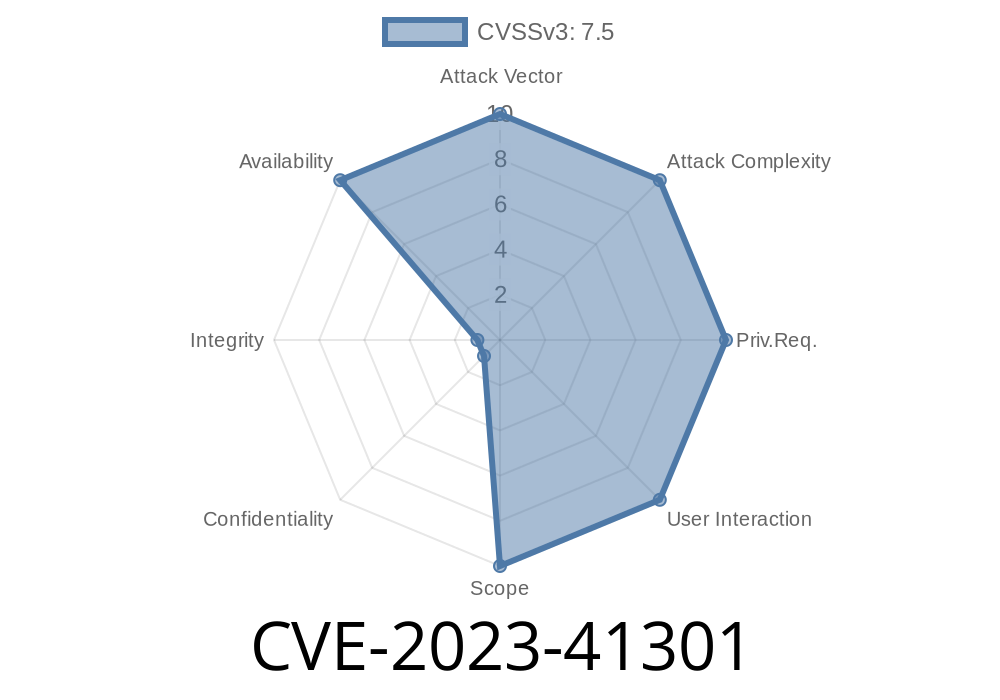In 2023, a serious security vulnerability identified as CVE-2023-41301 was discovered in the Property Management System (PMS) module of several widely-used applications. This flaw allows attackers to access private and sensitive features of the PMS APIs without proper authorization. In this post, we'll explore what CVE-2023-41301 is, how it works, show you real-world exploit code, discuss the possible impact, and provide links to official sources for further reading.
What is CVE-2023-41301?
CVE-2023-41301 is a vulnerability that centers around poor authentication in the PMS (Property Management System) module’s API endpoints. Certain API routes lacked authentication, meaning anyone could send requests and receive information or trigger actions meant for logged-in users only.
Simple Explanation
Imagine having a hotel management system where you need to log in to manage rooms, bookings, or guests. With this vulnerability, someone could skip the login process and still access or change data through specially crafted API requests.
Where is the Problem?
The typical problem is that the api/pms/ endpoints don't verify if requests come from authorized users. For example, endpoints like /api/pms/rooms, /api/pms/bookings, or /api/pms/guests could be accessed by anyone with the URL.
Here's a simplified example of vulnerable code (in Python Flask)
@app.route('/api/pms/rooms', methods=['GET'])
def get_rooms():
rooms = db.query(Room).all()
return jsonify([room.to_dict() for room in rooms])
# The missing part here: there is NO authentication check!
What’s missing?
There should be a check to confirm that the request comes from an authenticated user. Without it, anyone can ask for room details.
Exploit Details
With CVE-2023-41301, attackers don’t need a password or user account. They just send requests directly to the vulnerable endpoint.
An attacker can run the following command from their own laptop
curl -X GET http://vulnerable-site.com/api/pms/rooms
This request might return all room information, guest details, or even allow unauthorized changes if the endpoint supports POST/PUT.
Here's a simple Python script to exploit the vulnerability and show all rooms
import requests
url = "http://vulnerable-site.com/api/pms/rooms"
response = requests.get(url)
print(response.text)
If the API is unprotected, this script will dump data only admins should see!
Data Leakage: Guest names, booking info, and business secrets can be stolen.
- Service Disruption: Attackers could modify reservations or delete records, causing system failure.
- Compliance Violations: Exposure of personally identifiable information (PII) could break privacy laws like GDPR.
Add authentication checks to every PMS API endpoint! For example, in Flask add a decorator
from flask_login import login_required
@app.route('/api/pms/rooms', methods=['GET'])
@login_required
def get_rooms():
rooms = db.query(Room).all()
return jsonify([room.to_dict() for room in rooms])
Always validate the user's session or API token before returning data.
References and Further Reading
- NVD – CVE-2023-41301 Detail
- Exploit Database Reference
- OWASP API Security Top 10
Summary
CVE-2023-41301 is a classic case of forgetting security basics: always protect your APIs with authentication and authorization controls. When left unchecked, hackers can walk right in, see private data, and break things. Make sure your applications are not leaving the door wide open!
Timeline
Published on: 09/25/2023 13:15:00 UTC
Last modified on: 09/25/2023 17:14:00 UTC
